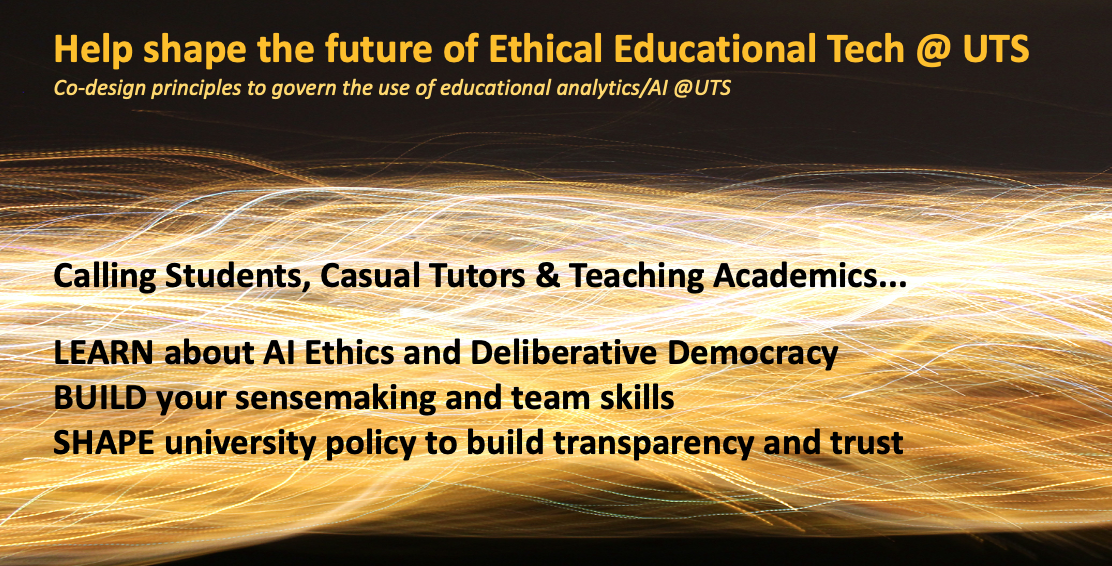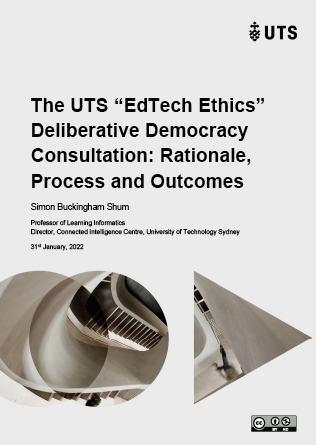Welcome!

Photo by Maxime VALCARCE on Unsplash
Sept 2021 update: There has been huge interest in this project, which is very encouraging, but applications are now closed. However, If you are not selected in the first round, you may still get a place if others decline their invitations. Members of the UTS community can express interest in future activities in the Keep Me Posted form.
Jan 2022 update: EdTech Ethics Report on the process and outcomes of the consultation published below.
June 2023 update: Carrying these principles forward, UTS publishes its AI Operations Policy and AI Operations Procedure governed by an AI Operations Board, including representation from the UTS Students Association, with ongoing student workshops on Generative AI and Predictive AI.
Jan 2024 update: Peer reviewed research paper accepted, updating the report below by documenting the interviews with participants (students, casual tutors, academics, senior leaders), and what happened after: Swist, T., Buckingham Shum, S. & Gulson, K. N. (In Press). Co-producing AIED Ethics Under Lockdown: An Empirical Study of Deliberative Democracy in Action. International Journal of Artificial Intelligence in Education. [blog post + paper]
EdTech Ethics Report:
Buckingham Shum, S. (2022), The UTS “EdTech Ethics” Deliberative Democracy Consultation: Rationale, Process and Outcomes. Connected Intelligence Centre, University of Technology Sydney, AUS. Published online 31 January, 2022: https://cic.uts.edu.au/projects/edtech-ethics
Executive Summary
This report has been written to document a novel community consultation process, using the principles and methods of Deliberative Democracy to consult with the UTS community on the following brief:
What principles should govern UTS use of analytics and artificial intelligence to improve teaching and learning for all, while minimising the possibility of harmful outcomes?
We’re sharing this to assist colleagues in UTS and beyond who are seeking more participatory models for community deliberation, with (in this case) specific application to the responsible use of educational technology that is powered by analytics and artificial intelligence. This is not a research paper, seeking to argue conceptual or empirical contributions to academic fields, although research is underway analysing and evaluating this process. We do hope, however, that this represents an interesting and novel ‘data point’ that others will find useful.
Deliberative Democracy (DD) is a movement in response to the crisis in confidence in how typical democratic systems engage citizens in decision making. DD works by creating a Deliberative Mini-Public (DMP). DMPs can be convened at different scales (organisation; community; region; nation) and can take many forms.
A DMP of 20 was selected through stratified sampling from UTS students, casual tutors and academics, who engaged in a series of five online workshops over seven weeks, due to Covid-19 conditions. With little to no prior knowledge among most members, they learned about the topic, worked well together, and converged on a set of principles that they felt reflected their shared values. The university experts who were involved in the workshops recognised the quality of the progress made in such a short period. UTS now has a plausibly representative expression of the community’s values, interests and concerns, in response to the brief. The principles can be viewed in Appendix 1: Draft Ethics Principles.
The raison d’etre for the initiative is to build trust within the university that these technologies are being deployed responsibly. The DMP process delivered on its promise to build engagement and trust across diverse stakeholders. The recording of the final briefing (18 mins, below) conveys the passion and commitment that the DMP invested in the process and outcome, reinforced by the preliminary themes emerging from interviews with students, educators and senior leaders.
Deliberative Democracy, even when conducted wholly online, would appear to offer educational institutions an approach to address the urgent need for meaningful student/staff consultation on the ethical implications of introducing Learning Analytics and Artificial Intelligence into teaching and learning. The implementation process is now beginning, which we will be studying with equal interest.
Overview
![]()
1. We know we’re all tracked online
Whatever we’re doing online these days — shopping, socialising, watching movies, finding a date, reading news, making a complaint, booking travel (remember that?!) — we’re pretty familiar with the idea that the websites are tracking every click. Each site is analysing how people are using its services, in order to improve its services. They may be testing different versions of their website to see if they can ‘nudge’ customers in different directions, and they may be using statistics or even artificial intelligence (AI) to predict what special offers you might respond to.
As these systems pervade society it’s reasonable to be concerned about how data and algorithms are shaping our lives, especially since in the wrong hands, they can be harmful.
![]()
2. Using these powers for good in education
Analytics and AI can now be used to improve learning (rather than selling stuff). In the hands of skilled educators, well-designed Educational Technology (EdTech) tools, powered by analytics and AI, can:
- show how teachers their students are going
- reveal how courses can be improved
- and provide feedback directly to students that’s more timely, personalised, precise and scalable than is possible without EdTech
![]()
3. UTS teaching and learning
As these technologies move from research labs into products, it’s important that we’re transparent about how data is being used, by whom, and why. You’re familiar with products like Office, Canvas, Zoom and Teams.
New specialist EdTech tools (some of which UTS has invented) are also emerging which you may not have used:
- instant feedback on writing
- regular, personalised feedback to each student, even when there are hundreds in the cohort
![]()
4. Principles to govern EdTech
All of these EdTech platforms log how they’re being used — who’s doing what and when, as they teach or learn. UTS is committed to ethical technology and social justice, so we take seriously the responsibility to use analytics and AI effectively and responsibly ourselves.
We’re inviting academics, casual tutors, and students to form a team to propose the ethical principles that should govern the use of EdTech powered by analytics and AI.
![]()
5. Will this make any difference?
Yes! The ethical principles will be presented (by the student/staff team who designed them) to the UTS policy makers responsible for how technologies are deployed in the university. The consultation has the support of Deputy Vice-Chancellor for Education & Students, the Chief Data Officer and the Head of Corporate Information. The intention is to adopt as many of these principles as possible.
Other universities have already published their ethical principles around educational analytics/AI, communicated in plain language to their communities. UTS will do the same, and we’ll get there using this deeply participatory approach.
![]()
6. Who’s running this?
This consultation is led by Professor Simon Buckingham Shum (Director of the Connected Intelligence Centre), whose team invents and evaluates Learning Analytics and AI educational tools for UTS, and trains educators in their use.
Independent facilitators with extensive expertise in democratic deliberation will facilitate the workshops.
Deliberative Democracy
Probably different to anything you’ve ever done
- Your typical community meeting is open to whoever has time and energy to show up, and where the loudest, most sophisticated, or most politically powerful voices often win.
- We’re also disillusioned with impoverished political debates that all too often ignore evidence, and descend into ‘yaa-boo’ party politics.
- In both cases, the quality of the discussion and decision-making is very poor.
Deliberative Democracy is a movement in response to this crisis in confidence in how decisions affecting citizens get made. It works by creating a Deliberative Mini-Public which can take many forms (you may have heard of Citizens’ Juries; Citizens’ Assemblies; Consensus Conferences).
Let’s break down this concept:
It’s deliberative…
Learn from experts about the topic (and you can request additional experts), and learn from your peers
Learn from professional facilitators how to build your own critical thinking, dialogue and team skills
Think about the interests of others as well as yourself
Compromise where required to reach broad agreement on the principles
It’s inclusive…
The group isn’t just whoever shows up: you’re selected by ‘stratified random sampling’ leading to a more representative, diverse group
A different mindset and dynamic: you’re not just there to share your mind, but to place yourself in the shoes of others who may have no voice
You own the outcome and can request expert input that you think is missing
It’s influential…
Your work will be shared with the UTS bodies responsible for data/AI ethics, with the promise that as many principles as possible will be adopted, and if changes are needed, they’ll provide an explanation
If we could all meet face-to-face like in the olden days, it would look like this — but rest assured, we’ll be getting as close as possible to this participatory experience online, with expert facilitators who know how to create really engaging team experiences!

Get involved!
Express interest in joining a small team of students and educators who will learn from experts how these technologies work, hear from teachers and students what it’s like to use them, and understand the ethical concerns that can arise. Your mission (cue Mission Impossible soundtrack) is to work together to propose the principles that University policy should implement.
Why me?
Very simply: because this is your university. No special knowledge or skills are required, other than to be ready to learn about the topic and the process, engage with the activities through careful deliberation, and work constructively to reach agreement.
What will I get out of this?
Apart from shaping policy for the UTS community…
Students
Engaging in these workshops, you’ll gain a rich mix of experiences and skills, and get paid!
Casual Tutors
As with the students, engaging in these workshops, you’ll gain a rich mix of experiences and skills, and of course, cover your time.
Teaching Academics
Engaging in deliberative democracy will give you some authentic professional/ leadership development.
Meet a diverse mix of motivated, interesting people, and learn about the ethics of EdTech, Big Data, and AI
Learn new deliberation skills and experience deliberative democracy first hand, as a radical new way for making complex, collective decisions
We pay UTS rates ($34.93/hr x 17 = $593.81) on completion of the 5 workshops and preparatory activities
We know your time’s precious, and appreciate you giving some of it up.
We pay UTS rates ($49.47/hr x 17 = $840.99) on completion of the 5 workshops and preparatory activities
We’re sorry we can’t pay you extra to participate, but hope this initiative still excites you enough to engage! We recognise of course that if you’re teaching this session then joining this may be impossible, but you can still express interest in future activities in the Keep Me Posted form.
What am I committing to?
Informed, respectful deliberation on complex issues can’t be rushed.
After all, that’s the reason so many people are disillusioned with our political processes.
A team of professional facilitators, using tried and tested methods, will host 5 online workshops.
Check your Thursday afternoons:
- Session 1: 21 Oct 1-4pm
- Session 2: 4 Nov 1-4pm
- Session 3: 18 Nov 1-4pm
- Session 4: 25 Nov 12-4pm
- Session 5: 2 Dec 2.30-4pm
Before we start, and between the meetings, there’ll be some resources that you’ll need to read, and the chance for online discussions.
There has been huge interest in this project, which is very encouraging, and applications are now closed.
However, If you are not selected in the first round, you may still get a place if others decline their invitations
Everyone’s voice can be heard…
You can express interest in future activities in the Keep Me Posted form.
Queries
If you have any questions, please email the UTS Connected Intelligence Centre with subject line: EdTech Ethics.
